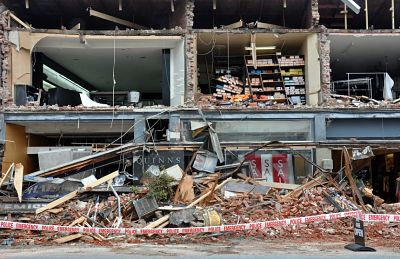
A major earthquake in Canada is inevitable, and when it happens this would likely overwhelm the insurance industry, according to a new report from the Toronto-based think tank, the C.D. Howe Institute published on Wednesday.
Therefore, the federal government should be prepared to prevent this natural disaster from becoming a systemic risk for the financial services sector, the report argues.
The report, which says that Canada will inevitably be struck by a major earthquake at some point, notes that 40% of Canadians live in areas classified as “moderate” or “high” risk for earthquakes. In particular, “there is at least a 30% chance of a significant quake” in British Columbia in the next 50 years and there’s a 5%-10% risk of a sizable earthquake risk in the Quebec City-Montreal-Ottawa corridor.
When such an event occurs, it would likely be the biggest natural disaster Canada has ever faced, the report says, noting that the impact could spread from the insurance industry to the overall financial system. To forestall such a risk, the report, which was written by former top federal regulator, Nick Le Pan, argues that the federal government should establish an emergency backstop arrangement.
“Since the financial crisis of 2007-08, policy-makers have focused on systemic risk to financial and economic systems, with most of the attention on the banking system,” the report says. “The framework for these efforts has been to build resiliency and shock absorbers to minimize the impact of financial shocks on the real economy. The inevitability of an earthquake in Canada poses a similar systemic financial risk for the insurance industry and the economy as a whole, and similar remedial efforts are required.”
Thus, the report recommends that a federal backstop guarantee could kick in beyond an industry-wide trigger of expected losses from an event, such as a one-in-500-year earthquake. Such an arrangement “would minimize the systemic financial impact resulting from such a catastrophic and likely uninsurable event on those affected and on the economy at large,” it says, adding that “the moral-hazard implications appear small compared to the benefits of avoiding serious systemic risk.”
At the same time, the report also recommends that the ability of the Property and Casualty Insurance Compensation Corp. (PACCIC) to deal with insurance industry problems and reduce systemic impacts should be beefed up as well.
In particular, the PACCIC should be strengthened so it can intervene before insurance companies in financial difficulty become insolvent and to ensure that it can borrow to reduce its liquidity needs in a crisis, the report recommends.
In addition, the industry and the government should alert homeowners to catastrophe risks, the report says: “This should encourage Canadians to evaluate the merits of disaster insurance coverage, particularly in the Quebec City-Montreal-Ottawa corridor where such insurance penetration is far too low.”
Photo copyright: Nigelspiers/123RF